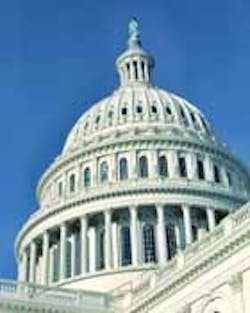WEF and AWWA Bring Key Issues to Congress
The two largest water associations in North America yesterday combined forces for the first time to push for smart approaches to water infrastructure finance and regulation through more than 400 meetings on Capitol Hill.
The American Water Works Assn. (AWWA) and the Water Environment Federation (WEF) brought more than 170 delegates from water, wastewater and storm water utilities in 49 states and Puerto Rico for the tenth Water Matters! Fly In.
Water professionals asked Congress for its support on several key issues during the Fly In, including:
Improved Water Infrastructure Finance Tools:
• Support the creation of a new water infrastructure finance mechanism to provide low-cost capital to water utilities needing to invest in infrastructure, as well as to State Revolving Funds; • Support reform and capitalization of state revolving loan fund programs for drinking water and wastewater; and • Remove water projects from the state volume cap on Private Activity Bonds.Renew the Federal Partnership in Meeting Clean and Drinking Water Challenges:
• Renew the federal commitment to help states and localities meet their obligations to provide clean and safe water to their communities and the public by funding and strengthening Clean Water and Drinking Water State Revolving Fund programs; • Fund Public Water System Supervision grants, State Clean Water Act program grants and the Clean Water Act Section 319 (non-point source) program; and • Fund the U.S. Geological Survey National Water Quality Assessment Program to provide adequate monitoring data on which to make management decisions.Chemical Facility Security—Support chemical security legislation that applies to water and wastewater utilities only if it:
• Assures local authorities make decisions on the best chemicals for water treatment, excluding orders to use “inherently safer technology;” • Applies to drinking water and wastewater systems only if they have chemicals of concern above identified threshold quantities; and • Provides adequate protection of sensitive information.Improving Clean Water Requirements: If the 112th Congress considers changes to the Clean Water Act or the Safe Drinking Water Act (SDWA), it should provide communities with both flexibility and affordability, the associations said. Congress should consider rational, even-handed approaches to revising Clean Water Act or SDWA requirements that both improve program delivery and/or state/local flexibility while advancing environmental and public health protections. Changes should incorporate sustainability and support a watershed approach to protecting and restoring water quality.
Support scientific processes when setting drinking water standards: Congress should support the methodical scientific approaches already contained in the SDWA for determining which substances to regulate in drinking water. AWWA and WEF encourage legislators to withhold support for bills that make legislative determinations on what should be scientific decisions.
Source: WEF
